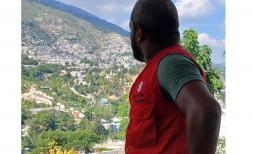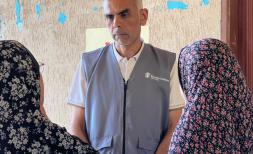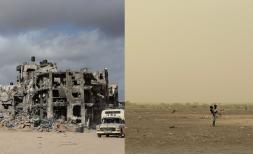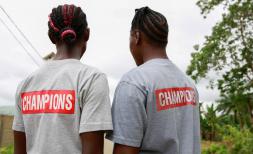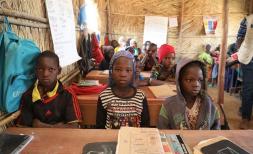Schools and faculties team up to fight COVID-19 outbreak
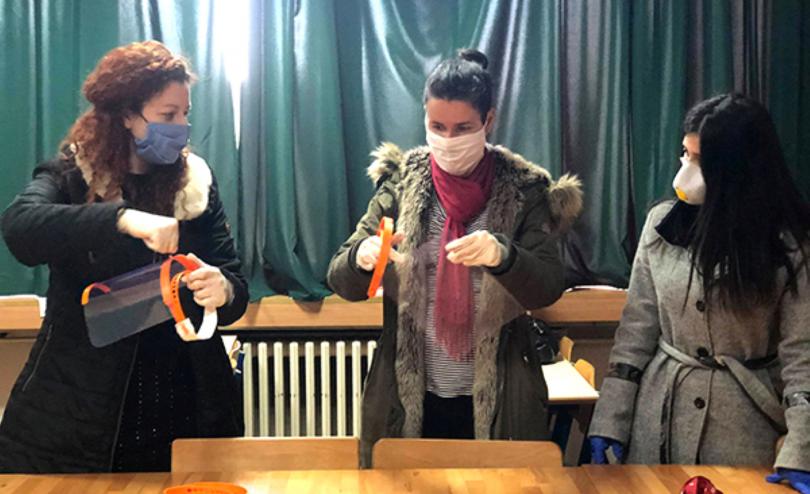
Through the fast reaction of actors of the Enhancing and Advancing Basic Learning and Education in Bosnia and Herzegovina (ENABLE BiH) project, protective gear to fight COVID-19 is being produced on daily basis, in primary and high schools and faculties in Bosnia and Herzegovina (BiH).
While classrooms are empty due to the threat of COVID-19 threat, professors and teachers in BiH teamed up to provide help to first responders through the production of protective face shields that will protect them from infection.
Inspired by the actions of other countries and using equipment donated by the United States Agency for International Development in BiH (USAID BiH), the ENABLE BiH project, implemented by Save the Children, mobilised schools’ 3D printers to make and distribute the much needed shields for medical personnel and other frontline workers free of charge.
ABOUT ENABLE BIH
Save the Children started implementing the project Enhancing and Advancing Basic Learning and Education in Bosnia and Herzegovina (ENABLE BiH) in September 2016, supported by the United States Agency for International Development in BiH (USAID BiH). ENABLE BiH intends to ensure that students in BiH acquire the key competences necessary to participate in a knowledge-based economy and become carriers of economic development in the future.
ENABLE BiH team has been coordinating efforts with all stakeholders and experts across the country to optimize the 3D printers in the fight against COVID-19 spread.
EARLIER EXPERIENCES AND KNOWLEDGE ALLOWED FOR A FAST REACTION
Computer Sciences teacher Nijad Salihovic, science, technology, engineering and mathematics (STEM) teaching coordinator for the ENABLE BiH project, found himself in Banjaluka Gymnasium at the time the schools were closed down due to global pandemic. He was training teaching staff in the area of Arduino on 3D printing and Google Classroom. Upon returning to his home school, Ninth Primary School Maoca in Brcko District, he immediately organised a workshop on online teaching for his colleagues. Nijgad he had been working with his students for five years using the "Flipped classroom" method and so all his students ware already registered on the online platform.
Under the influence of the new situation, teacher Nijad looked for information about the coronavirus and thought about how he can contribute to reducing the consequences on children's education.
"I had to do something, I can't just sit with my arms crossed. From what I saw, I realized that the biggest problem would be if members of medical staff became infected. I decided to design a face shield and suggest to the school administration that we use 3D printer that we received through the ENABLE BiH project to make the field shields. I did the design in Tinkercad and posted it as "public", so if anyone likes it, they can use it freely. I started printing and the first delivery of 10 shields was sent to Brcko Hospital," explains Nijad.
As Banjaluka became one of the hot spots of the epidemic, teacher Nijad sent the design he made to the Google Classroom of Banjaluka Gymnasium, so they could start with production as well. Gymnasium responded quickly and on the first day they printed three shields.
By the time this text was concluded, on 10th April, Ninth Primary School Maoca had delivered over 75 face shields. But this school did not stop there - the chemistry teacher expanded the project to create disinfectants. Another idea is to use Arduino to make a non-contact dispenser for hand disinfection. Meanwhile, the improved face shield 3D printer design at Tinkercad has been downloaded by 28 people from around the world.
UNEXPECTED TESTING OF NEWLY ACQUIRED SKILLS
Banjaluka Gymnasium received training on how to work a 3D printer only on 10th March this year, but circumstances were such that they were very quickly able to put the newly acquired skills into practice for the common good. The action was initiated by four professors from the Gymnasium, and they were joined by one student who has a 3D printer at home, so he creates the face shields in his home. The delivery of the first 10 shields went to the Centre "Protect Me", an educational institution for children with disabilities.
Professor Tamara Jagodic tells us that this work is the result of incredible circumstances, because on 10th March 10, when professors received their training on how to work 3D printers, on the same day they received the news that the school was closing.
"We have been able to learn enough to put the printer into operation with the help of colleagues who have experience. Our trainer Nijad Salihovic from Brcko, as well as our colleagues from the Faculty of Mathematics and Natural Sciences, provided great help. They helped us with the design of the model itself, so now we have reached a capacity of 4 visors a day," says Professor Tamara Jagodic, adding: "We hope that our capacity will be 20 to 30 visors a day. After health facilities in Banjaluka, we will check the situation in other cities and work to the best of our ability."
She says that teachers and professors have next to no free time in the current circumstances in which they work, because they are available to their students almost 24 hours a day.
"During the day we are available to them for their tasks and questions, and during the night we review their homework, write reports, plans, prepare classes. We were unprepared for this situation, but we had to adapt in a short period of time and be ready to meet all of our students' questions. Because of this, the time is short. With the help of other on-call workers, we were able to come to an agreement that we start the machines, put together the visors, so that we can get back to our commitments with regard to distance learning," said Professor Tamara.
ENABLE BIH MODEL SCHOOLS MAKE THEIR CONTRIBUTION
Both Ninth Primary School Maoca and Banjaluka Gymnasium are among the 12 STEM model schools whose teaching staff had the opportunity to participate in specialist trainings through the ENABLE BiH project, and where modern STEM cabinets were equipped, including 3D printers.
Meanwhile, STEM model schools Primary School Vasa Cubrilovic from Gradiška and Primary School Zalik from Mostar also joined the production of protective shields. Primary School Amer Cenanovic Ilidza, Third Gymnasium Sarajevo, Gymnasium Vaso Pelagic from Brcko, Primary School Petra Bakule Mostar, Gymnasium Filip Visnjic from Bijeljina, Primary School Sveti Sava from Doboj and Primary School Petar Petrovic Njegos from Eastern Ilidza have outsourced their 3D printers to the closest institutions of higher education that built their 3D printer farms and produce larger quantities of shields daily.
TEACHING ASSISTANTS AT THE FACULTY OF MATHEMATICS AND NATURAL SCIENCES IN BANJALUKA INITIATED PRODUCTION
Experts from the Faculty of Mathematics and Natural Sciences of the University of Banjaluka work on a daily basis to produce protective face shields using a 3D printer.
The initiative, started by young assistants from the Department of Computer and Information Science, is also supported by the Ministry of Science and Technology, Higher Education and the Information Society. After prototyping and initial testing, the company began its batch production, which now includes about a dozen other employed laboratory assistants, teaching assistants and professors. Production takes place at the Faculty's STEM laboratory, which was opened as part of USAID's ENABLE BiH project. There are currently five 3D printers in operation, one owned by the Faculty, with the remaining four coming from STEM model schools.
"Currently, 14 visors are being produced daily, and the plan is to further expand production in the coming period by increasing capacity and optimizing production. So far, about 30 visors have been delivered to the University Clinical Center of Republika Srpska, and a consignment of 12 visors has been sent to Doboj. Several visors have been given to healthcare professionals who are engaged in working with patients in newly formed accommodation for persons positive to the coronavirus in the Student dormitory, as well as the Pediatricians Association,” said Head of the Chatedra of Computer and Information Science, prof. Dr Dragan Matic.
THE ROLE OF THE BUSINESS SECTOR
Dozens of engineering firms have also become involved in the production of protective equipment for people and institutions that work directly with the vulnerable people. Among them is Intera Technology Park from Mostar, also one of the partners of the ENABLE BiH project. In cooperation with the Student Assembly of the University of Mostar, they began to design visors for the needs of Mostar hospitals and health centers. Their printer farm was joined by a 3D printer from the Center for Technical Culture in Mostar, also donated through the ENABLE BiH project.
